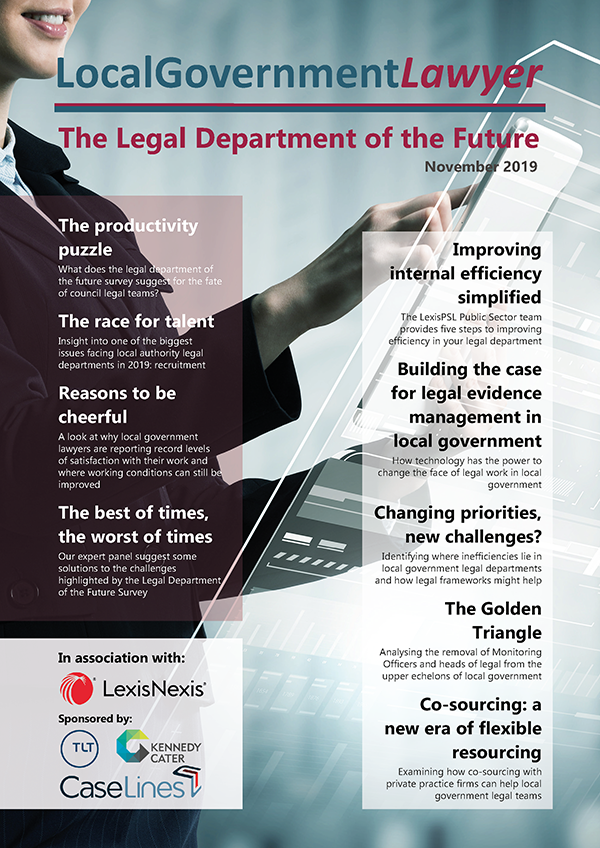Building the case for legal evidence management in local government
Andrea Kilby, Director of UK Business Development at CaseLines, highlights how technology has the power to change the face of legal work in local government.

The pressure on local government to make cost savings continues – with central government funding reduced by nearly £16 billion over the last decade. One area where potentially significant savings and operational efficiencies can be made is in streamlining the way local authorities manage legal processes, using technology to automate routine tasks and cut the reliance on manually-intensive paper-based processes. With legal caseloads for local government expected to increase significantly in coming years, local authorities need to rethink their approach.
Strategy for change
The Legal Department of the Future 2019 survey found that 87% of respondents expect their legal work to increase in the foreseeable future. At least half of the 75 heads of legal that took part in the survey expect a “significant” increase of 10% or more.
What’s surprising is that while cost control is one of the top three challenges faced by heads of legal (cited by 53%), many have not yet considered the role technology can play in cost reduction. Recruitment is cited by 70% as the number one problem they face. But only 10% of respondents expect to be able to increase the number of lawyers they employ and 8% expect the numbers of lawyers in their teams to shrink.
The survey, and roundtable discussion that followed, highlighted that local government, councils and authorities are likely to fall back to the same coping strategies used in the past and continue to use existing resources and processes. This includes outsourcing work to private law firms which can charge up to £200-£300 per hour – a tactic that further exacerbates already overstretched budgets. Surprisingly, growth in legal technology spending is predicted to be quite slow even though most recognise the productivity benefits of using it. For many it seems that the difficulty of calculating the return on IT investment is a major impediment.
The reality is that technology solutions are out there which will allow local authorities to work smarter, streamline processes and recoup the cost of the initial investment in just a matter of months. Investment in technology to enable efficiencies can produce significant cost savings over the longer term, allowing local authorities to demonstrate to taxpayers how they are saving money through strategic investments in technology for the benefit of all.
Proven savings
Some councils are working with neighbouring authorities to save time and costs of investment in technology to enable efficiencies and maximise Return on Investment (ROI). For example, Orbis Public Law (OPL) the legal services of Surrey County Council, Brighton and Hove City Council, and East and West Sussex county councils working in partnership drove the transition to digital courts together. After implementing CaseLines’ digital evidence management and presentation platform, OPL was able to recoup the initial investment within just six months. The system has paid for itself by virtue of the money the local authority saves from no longer needing to transport mountains of paper evidence to court. In fact, for the 2019/20 financial year CaseLines technology is expected to help save the councils a total of £90,000.
CaseLines allows parties to prepare, collaborate and present cases including documentary and audio-visual evidence securely in one system, to be called up by judges on laptops in court – or at home or while travelling. The software presents documents as if they were in a paper bundle, but in a searchable and consistent form. In court, this makes it easy for judges and lawyers to use, and all parties in the case can be directed to a particular paragraph of evidence quickly which isn’t so easy to achieve with paper-based bundles, where evidence is collated and stored across multiple lever arch files.
An OPL joint committee report on the impact of CaseLines stated: “Judges reported significant efficiencies in hearing preparation. They noted the ability to be able to work at home without the need to transport numerous lever arch files as well as being able to make notes electronically and move swiftly between pages during reading of the bundle. Solicitors and advocates have reported similar benefits.”
Paralegals and junior staff, whose jobs are heavily admin based, also get more opportunities for career development. For example, case bundles will typically take one-quarter of the time required to prepare the paper-based equivalent, allowing them to cope with demand volumes and use their skills on more interesting work.
In summary, when it comes to recruiting and retaining local government lawyers and legal support staff, and equipping them to handle ever-increasing workloads, the evidence shows that investing in the right technology will be money well spent.
Andrea Kilby is Director of UK Business Development at CaseLines. www.caselines.com

This article appeared in the Legal Department of the Future report, published in November 2019. To read or download the full report, please click on the following link: http://www.localgovernmentlawyer.co.uk/legal-dept-of-the-future

